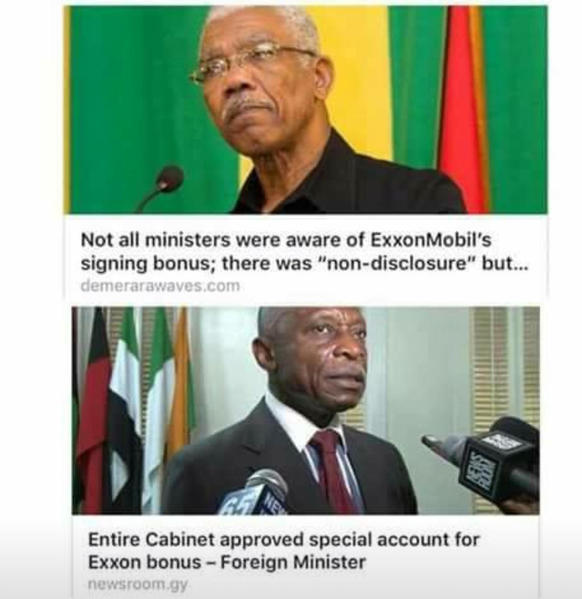December 16,2017
Dear Editor,
I refer to yesterday’s article in the Stabroek News under the caption ‘Greenidge says he advised against disclosing the bonus’ and wish to comment as follows:
At the time when Mr Christopher Ram alleged that the government received a signing bonus of US$20 million from ExxonMobil, there was no indication of the purpose for which the money was paid. All the media asked for was confirmation of the truth or otherwise of the allegation.
Government vehemently denied the existence of such a transaction, one official referring to the allegation as “a figment of imagination”. It was not until evidence was produced in the form of a letter from the Finance Secretary dated September 2016 to the Governor of the Bank to open a special account with a number of ministry officials as signatories to the account, that the government was forced to acknowledge the receipt of US$18 million. It is important to note that the letter did not indicate the purpose of the special account.
Having been forced to admit receiving the signing bonus, the concern was not about the purpose of the special account but rather about the secret nature of the transaction and the failure to deposit the proceeds into the Consolidated Fund, as provided for under Article 216 of the Constitution and Section 38 of the FMA Act.
It was then that the government disclosed that the transaction was kept in a special account for national security reasons and that US$15 million was for the payment of legal services should the border controversy with Venezuela be referred to the World Court. However, nobody asked for this information which could have still remained confidential while at the same time acknowledging receipt of the money.
Then, the residual question would have been: why not place the money in the Consolidated Fund? I note the explanation provided by government officials which I am not in agreement with and which I shall deal with in my column on Monday.
The government has itself to blame for the signing bonus scandal which has caused irreparable damage to its credibility as well its efforts to secure good governance, transparency and accountability.
As it stands, the government’s candidate membership of the Extractive Industry Transparency Initiative (EITI) is now in jeopardy. The EITI has promulgated standards which participating countries are required to observe, including the publication of timely and accurate information on key aspects of their natural resource management, how licences are allocated, how much tax and social contributions companies are paying and where this money ends up in the government.
Those standards have been breached in respect of the signing bonus from ExxonMobil.
Rather than seeking to defend the indefensible, the government should do the morally right, indeed the honourable thing, by openly acknowledging its mistake. None of the explanations provided so far have justified the secrecy surrounding the receipt of the bonus from ExxonMobil, the vehement denial of the existence of the transaction when evidence was provided otherwise, and the failure to place the money in the Consolidated Fund.
Finally, it is time to move on. I call on the government to regularise the transaction by placing the money in the Consolidated Fund. Alternatively, it could establish an Extra-budgetary Fund via an Act of Parliament with appropriate safeguards to ensure the highest degree of transparency and accountability, as provided by Section 39 of the FMA Act. More of this on Monday.
Yours faithfully,
Anand Goolsarran


